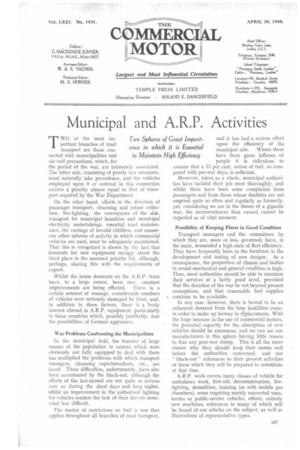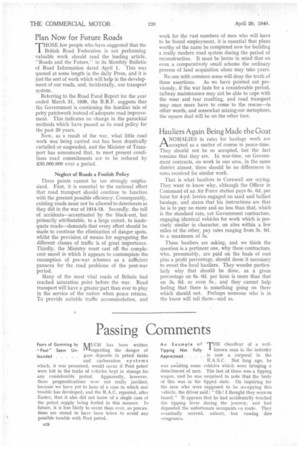Municipal and A.R.P. Activities
Page 45

Page 46

If you've noticed an error in this article please click here to report it so we can fix it.
TWO of the most important branches of road transport are those connected with municipalities and air-raid precautions, which, for the period of the war, are intimately associated. The latter side, consisting of purely war measures, must naturally take precedence, and the vehicles employed upon it or ordered in this connection receive a priority almost equal to that of transport required by the War Department.
On the other hand, efforts in the direction of passenger transport, cleansing and refuse collection, fire-fighting, the conveyance of the sick, transport for municipal laundries and municipal electricity undertakings, essential road maintenance, the carriage of invalid children, and numerous other spheres of activity in which commercial vehicles are used, must be adequately maintained. That this is recognized is shown by the fact that demands for new equipment occupy about the third place in the assumed priority list, although, perhaps, sharing this with the requirements of export.
Whilst the home demands on the A.R.P. front have, to a large extent, been met, constant improvements are being effected. There is a certain amount of wastage, considerable numbers of vehicles were seriously damaged by frost, and, in addition to these factors, there is a lively interest abroad in A.R.P. 'equipment, particularly in those countries which, possibly justifiably, fear the possibilities of German aggression.
War Problems Confronting the Municipalities In the municipal field, the :transfer of large masses of the poPulation to centres which were obviously not fully equipped to deal with them has multiplied the problems with which transport managers, cleansing superintendents, etc., are faced. These difficulties, unfortunately, have also been accentuated by the black-out, although the effects of the last-named are not quite so serious now as during the short days and long nights, whilst an improvement in the authorized lighting for vehicles renders the task of their drivers somewhat less difficult.
The matter of restrictions on fuel is bne that applies throughout all branches of road transport, and it has had a serious effect upon the efficiency of the municipal side. Where there have been great influxes of people it is ridiculous to assume that a 75 per cent. ration of fuel, as compared with pre-war days, is sufficient.
However, taken as a whole, municipal authorities have tackled their job most thoroughly, and whilst there have been some complaints from passengers and from those whose dustbins are not emptied quite so often and regularly as formerly, yet, considering we are in the throes of a gigantic war, the inconveniences thus caused cannot be regarded as of vital moment.
Possibility of Keeping Fleets in Good Condition Transport managers and the committees by which they are, more or less, governed, have, in the main, demanded a high state of fleet efficiency. They have frequently been in the forefront in the development and testing of new designs. As a consequence, the proportion of chassis and bodies in sound mechanical and general condition is high. Thus, most authorities should be able to maintain their services at a fairly good level, provided that the duration of the war be not beyond present conceptions, and that reasonable fuel supplies continue to be available.
In any case, however, there is bound to be an enhanced demand from the time hostilities cease, in order to make up leeway in replacements. With the huge increase in the use of commercial motors, the potential capacity for the absorption of new vehicles should be enormous, and we can see our manufacturers in this sphere Mving little reason to fear any post-war slump. This is all the more reason why they should keep their names well before the authorities concerned, and not " black-out " references to their present activities or those which they will be prepared to reinstitute at that time.
A.R.P. work covers many classes of vehicle for ambulance work, first-aid, decontamination, firefighting, demolition, training (as with mobile gas chambers), some requiring merely converted vans, lorries or public-service vehicles, others, entirely new machines, references to many of which will be found irr our articles on the subject, as well as illustrations of representative types.
Plan Now for Future Roads
THOSE few people who have suggested that the I British Road Federation is not performing valuable work should read the leading article, "Roads and the Future," in its Monthly Bulletin of Road Information dated April 1. This was quoted at some length in the daily Press, and it is just the sort of work which will help in the development of our roads, and, incidentally, our transport system.
Referring to the Road Fund Report for the year ended March 31, 1939, the B.R.F. suggests that the Government is continuing the familiar tale of petty patchwork instead of adequate road improvement. This indicates no change in the parochial methods which have passed as its road policy for the past 20 years.
Now, as a result of the war, what little road work was being carried out has been drastically curtailed or suspended, and the Minister of Transport has announced that, to meet present conditions road commitments are to be reduced by £50,000,000 over a period.
Neglect of Roads a Foolish Policy Three points cannot be too strongly emphasized. First, it is essential to the national effort that road transport should continue to function with the greatest possible efficiency. Consequently, existing roads must not be allowed to deteriorate as they did in the war of 1914-18. Secondly, the toll of accidents—accentuated by the black-out, but primarily attributable, to a large extent, to inadequate roads—demands that every effort should be made to continue the elimination of danger spots, whilst the provision of means for segregating the different classes of traffic is of great importance. Thirdly, the Ministry must cast off the complacent mood in which it appears to contemplate the resumption of pre-war schemes as a sufficient panacea for the road problems of the post-war period.
Many of the most vital roads of Britain had reached saturation point before the war. Road transport will have a greater part than ever to play in the service of the nation when peace returns. To provide suitable traffic accommodation, and work for the vast numbers of men who will have to be found employment, it is essential that plans worthy of the name be completed now for building a really modern road system during the period of reconstruction. It must be borne in mind that on even a comparatively small scheme the ordinary process of land acquisition alone may take years.
No one with common sense will deny the truth of these assertions. As we have pointed out previously, if the war lasts for a considerable period, railway maintenance may not be able to cope with the wear and tear resulting, and road transport may once more have to come• to the rescue—in other words, and somewhat mixing our metaphors, the square deal will be on the other foot.
Hauliers Again Being Made the Goat
ANOMALIES in rates for haulage work are accepted as a matter of course in peace-time. They should not be so accepted, but the fact remains that they are. In war-time, on Government contracts, on work in one area, in the same district almost, there should be no differences in rates received for similar work.
That is what hauliers in Cornwall are saying. They want to know why, although the Officer in Command of an Air Force station pays Os. Ocl. per hour for 4-yd. lorries engaged on sand and ballast haulage, and states that his instructions are that he is to pay no more and no less than that, which is the standard rate, yet Government contractors, engaging identical vehicles for work which is precisely similar in character, on sites within a few miles of the other, pay rates ranging from 3s. 9d. to a maximum of 5s.
These hauliers are asking, and we think the question is a pertinent one, why these contractors, who, presumably, are paid on the basis of cost plus a profit percentage, should deem it necessary to sweat the local hauliers. They wonder particularly why that should be done, as a given percentage on 6s. 6d. per hour is more than that on 3s. 9d. or even 5s., and they cannot help feeling that there is something going on there which should not. Perhaps someone who is in the know will tell them—and us.




































































































